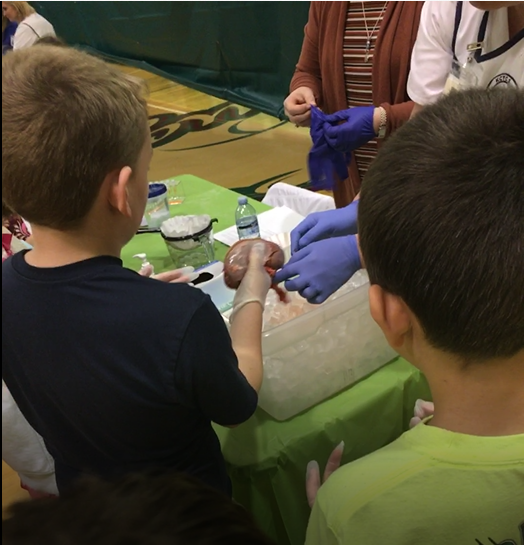Kentucky Circuit Clerks' Trust For Life
We register Kentucky residents as organ donors.
VisitJoin more than 2,031,230 registered donors
Register

Community Outreach team members are available to speak in a variety of settings and embrace the opportunity to do so. We educate on the importance of the Donor Registry, dispel myths and misconceptions, and answer questions about donation and transplantation.
Presentations to:
Click here to share your story of inspiration with others. Who knows, you may help save someone’s life.
According to HRSA almost 60% of the national transplant waiting list is made up of men, women, and children from multicultural populations. This is because some diseases of the kidney, heart, lung, pancreas, and liver are found more frequently in these populations.
Transplant success rates increase when organs are matched between members of the same ethnic and racial group. For multicultural communities, there is a shortage of organs available for transplantation due to the lack of registered donors from these populations. Consequently, a lack of organs donated by minorities makes the waiting 2 times longer for the multicultural population.
There are many ways to raise awareness in the multicultural community, such as learning the truths about organ and tissue donation, reviewing resources for faith communities, liking us on Facebook and following on Twitter, and schedule a speaker for your organization today. For more information or to schedule a speaking engagement, contact Crysta McGee at c.mcgee@kodaorgan.org.

Our High School Challenge is a chance for Kentucky students to learn about the importance of organ, cornea and tissue donation and share that message with others in their schools and communities. Club chapters will do different activities to educate others about donation and encourage them to register as donors. Chapters will compete against each other to register the most donors! 1st place winners receive $1,000, 2nd place $500, 3rd $250, and there will be prizes for just meeting your goal, social media and potentially student scholarships! Sign up here: bit.ly/2019hschallenge
The competition will run October 13th through November 4th. This goes through Halloween and National Donor Sabbath. Our competition theme this year is Be Magical, Be an Organ Donor. Get creative with your marketing!
There’s a list of activities you can do. The more interactive the activity, the more points you receive. You can also make your own events and get points assigned accordingly. Click here to see an example scorecard.
Getting involved is easy, just follow these simple steps: 1. Register your chapter for the challenge by Friday, August 23. bit.ly/2019hschallenge 2. Attend the webinar training session on date that’s to be announced. 3. Plan your activities. They must take place during the challenge. 4. Submit pictures through the Bridge2Life app.
Yes, students 15 and older can express their wishes to be an organ, cornea and tissue donor by joining the Donate Life Registry. A learner’s permit or driver’s license is not necessary to register as a donor.
Contact Crysta McGee at c.mcgee@kodaorgan.org
Fill out this form: bit.ly/2019hschallenge
What is Life Is Cool?
It is a FREE program for Kentucky 4th graders and a state-approved curriculum on organs, tissues, eyes, and blood and the importance of healthy life choices. Students participate in five one hour classroom lessons and then enjoy a hands-on event that includes 10 different learning stations staffed by healthcare personnel and volunteers from across Kentucky.
Each participating teacher receives a digital teaching guide complete with Powerpoint presentations, handouts and support materials for the five teaching sessions. Each student is provided a workbook to go along with the teaching sessions. All of this is provided at no cost to the school or student. The program finale is the on-site Life Is Cool learning fair that students, teachers, and volunteers won’t soon forget!
Want to bring Life is Cool to a school(s) in your community? Or just want to learn more about it? Complete the form below and we will get in touch with you as soon as possible to get the process started.


No. Income and celebrity status are not considered when determining who receives an organ. Also, it is a federal crime to buy or sell organs and tissues in the United States. Donor organs are matched to potential recipients by blood type, tissue type, size, medical urgency, time on waiting list and geographic location through a national computerized waiting list operated by the United Network for Organ Sharing (UNOS).
No. While organ, eye and tissue donation involves saving lives in the real world, the entertainment industry often invents false situations and perpetuates misconceptions about donation by using dramatization and sensationalism.
Register your decision in the Donor Registry by:
1. Saying “yes” to organ donation when you obtain or renew your driver’s license or state identification card
at the Circuit Court Clerk’s Office.
2. Going to RegisterMe.org.
3. Completing form in the Medical ID tab of your iPhone Health App.
Once you have registered your decision, it is important to discuss your wishes about donation with your family so that they are aware of the generous choice you have made.
Yes, the Kentucky Donor Registry ensures that a person’s desire to be a donor is honored after death. All recovery organizations are directed by law to inform the next of kin of the decision to donate and to work with the donor’s family to honor this wish. This eliminates the need for a family to make a major decision about donation during their time of grief when they may not know, or be able to recall clearly, what their loved one had wanted.
At any point in time, you can remove yourself from the Kentucky Donor Registry call Trust For Life or by going online.
No. When an individual registers, it’s treated like a will. Families cannot overturn your decision to donate if it’s possible and you are registered. Kentucky is a first person consent state.
Yes, you may join the Kentucky Donor Registry as long as you have a state identification card, driver’s license or permit—although parental authorization is not needed for individuals under 18, a parent may revoke the decision upon a minor’s death.
Once a person turns 18, the decision to say “yes” is considered a legal, advanced directive. You should still inform your family of your decision. Upon your death, the recovery organization will inform them of your
decision to be a donor and will involve them in the donation process, but will not ask them for authorization.
All deaths occur from cessation of cardiopulmonary (heart-lung) function or from the cessation of brain function. Brain death occurs when a person has an irreversible, catastrophic brain injury, which causes all brain activity to permanently stop. You can never recover from brain death. Brain damage means there are some portions of the brain still functioning, meaning that person is not brain dead. In brain death cases, the heart and lungs can continue to function if artificial-support machines are used.
However, these functions will cease when the machines are discontinued. The standards for determining that someone is brain dead are strict. After cardiac death, an individual has the potential to be an eye and tissue donor and, on occasion, an organ donor.
Organs that can be donated include: kidneys, heart, liver, lungs, pancreas and small intestine. Tissue that can be donated includes: heart valves, corneas, skin, bone, ligaments, tendons, fascia, veins and nerves.
One organ donor can save up to eight lives. One tissue donor can heal more than 75 lives.
Anyone could be a potential donor and everyone should consider registering, at any age. It’s important because less than 1% of the population ends up being eligible to donate based on the circumstances that must be met.
When Can Organs Be Donated?
Anyone could be a potential donor and everyone should consider registering, at any age. It’s important because less than 1% of the population ends up being eligible to donate based on the circumstances that must be met.
To be eligible for organ donation, a person must be declared brain dead with no brain activity, and kept on a ventilator. Patients with partial brain injury and coma patients are still alive and receiving blood to the brain, meaning they are not candidates for donation.
Understanding Brain Death
Brain death is permanent. It’s the irreversible loss of the brain and brain stem, where all brain tissue is dead and no blood flow or electrical activity is present.
Leading Causes
How Donation Works
Organ procurement takes place like any other surgery—in a sterile operating room with careful, experienced surgeons. After the surgery, recovery professionals perform routine reconstruction and preservation so customary funeral arrangements are possible.
By Donation Only
Buying and selling organs is a federal crime. Among practical and ethical reasons, buying and selling organs would lead to inequitable access and some would have an unfair advantage based on wealth.
Fact or Fiction
Donor families don’t pay hospitals for organ donation surgery.
Organ and tissue recovery agencies assume expenses—donor families are never responsible for medical costs associated with donation.
Fact!
Organ donation doesn’t interfere with the donor’s funeral.
Donation does not prohibit any part of the standard funeral process, including the ability to have an open-casket funeral.
Fact!
Doctors won’t try as hard to save patients who are registered donors.
Doctors have no influence on donation, and would lose their medical license if they didn’t make every attempt to save a patient’s life.
Fiction!
Being placed on the transplant waiting list doesn’t mean an automatic transplant. Thousands of patients in need of transplants are often forced to wait for days, months, even years without knowing if and when they’ll receive what they need.
Every 10 Minutes
That’s how quickly another name is added to the National Transplant waiting list. However, it’s a wait so many have no other choice but to take.
Worth the Wait
With so few organs available, before someone is added to the list, professionals have to determine if that patient is emotionally, physically and financially stable enough to take care of the new organ for the rest of his or her life.
Waitlist Factor:
Factors Not Considered:
Finding a Match
People waiting for transplants are on the national list for potential transplants and listed at their transplant center. The United Network for Organ Sharing (UNOS) maintains the list and aids in finding compatible matches 24 hours a day, every day.